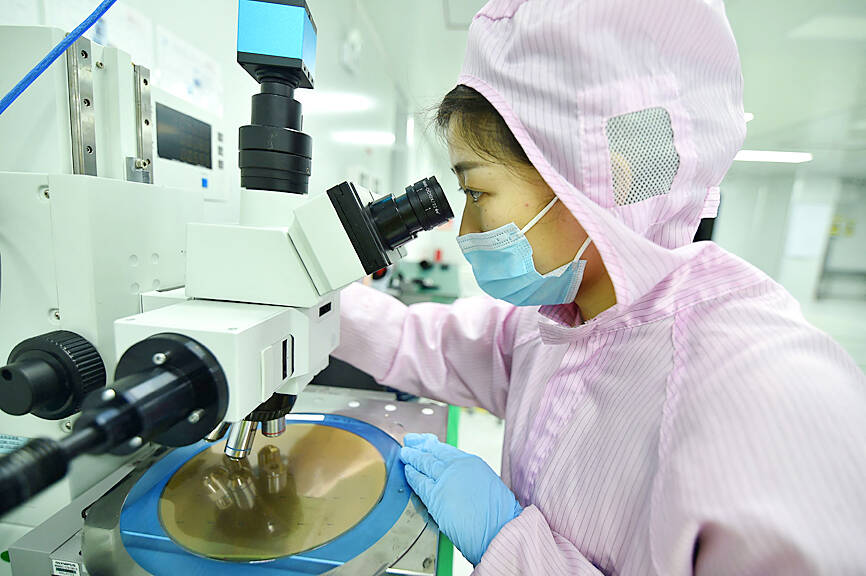Chinese companies are buying US chipmaking equipment to make advanced semiconductors, despite a raft of new export curbs aimed at thwarting advances in the country’s semiconductor industry, a report said on Tuesday.
The 741-page annual report, released by the US-China Economic and Security Review Commission, takes aim at the export curbs imposed in October last year by the administration of US President Joe Biden, which seek to bar Chinese chipmakers from getting US chipmaking tools if they would be used to manufacture advanced chips at the 14-nanometer node or below.
With the US Department of Commerce using the 14-nanometer restriction limit, “importers are often able to purchase the equipment if they claim it is being used on an older production line, and with limited capacity for end-use inspections, it is difficult to verify the equipment is not being used to produce more advanced chips,” the report said.

Photo: Reuters
The finding comes as the US scrambles to figure out how Chinese telecoms giant Huawei Technologies Co (華為) produced an advanced 7-nanometer chip to power its Mate 60 Pro smartphone at China’s top chipmaker, Semiconductor Manufacturing International Corp (SMIC, 中芯), despite the export curbs announced last year.
Huawei and SMIC were also added to a trade restriction list in 2019 and 2020, which in theory bars US suppliers from shipping some technology to the companies.
China watchers had theorized that SMIC could have made the chip with equipment obtained prior to last year’s rules, but it had other options for obtaining the equipment from overseas, the report said.
The US plugged a key loophole in its efforts to stymie China’s access to advanced chipmaking tools by convincing allies Japan and the Netherlands, with similarly robust chipmaking equipment industries, to announce their own restrictions on exports of the technology.
However, China stockpiled equipment by taking advantage of the lag between the US’ rules, and Japan and the Netherlands’ similar moves in July and September respectively, the report said.
In the first eight months of this year, China imported US$3.2 billion of semiconductor manufacturing machines from the Netherlands, a 96.1 percent increase over the US$1.7 billion in the same period last year, the report said.
China’s imports of semiconductor equipment from all countries totaled US$13.8 billion in the period, it said.
The report does not outline a specific recommendation to address the gaps in the US rules, but urges the US Congress to request an annual evaluation, to be completed within six months by the US General Accountability Office and later made public, of the effectiveness of export controls on chipmaking equipment to China.

The US dollar was trading at NT$29.7 at 10am today on the Taipei Foreign Exchange, as the New Taiwan dollar gained NT$1.364 from the previous close last week. The NT dollar continued to rise today, after surging 3.07 percent on Friday. After opening at NT$30.91, the NT dollar gained more than NT$1 in just 15 minutes, briefly passing the NT$30 mark. Before the US Department of the Treasury's semi-annual currency report came out, expectations that the NT dollar would keep rising were already building. The NT dollar on Friday closed at NT$31.064, up by NT$0.953 — a 3.07 percent single-day gain. Today,

‘SHORT TERM’: The local currency would likely remain strong in the near term, driven by anticipated US trade pressure, capital inflows and expectations of a US Fed rate cut The US dollar is expected to fall below NT$30 in the near term, as traders anticipate increased pressure from Washington for Taiwan to allow the New Taiwan dollar to appreciate, Cathay United Bank (國泰世華銀行) chief economist Lin Chi-chao (林啟超) said. Following a sharp drop in the greenback against the NT dollar on Friday, Lin told the Central News Agency that the local currency is likely to remain strong in the short term, driven in part by market psychology surrounding anticipated US policy pressure. On Friday, the US dollar fell NT$0.953, or 3.07 percent, closing at NT$31.064 — its lowest level since Jan.

The New Taiwan dollar and Taiwanese stocks surged on signs that trade tensions between the world’s top two economies might start easing and as US tech earnings boosted the outlook of the nation’s semiconductor exports. The NT dollar strengthened as much as 3.8 percent versus the US dollar to 30.815, the biggest intraday gain since January 2011, closing at NT$31.064. The benchmark TAIEX jumped 2.73 percent to outperform the region’s equity gauges. Outlook for global trade improved after China said it is assessing possible trade talks with the US, providing a boost for the nation’s currency and shares. As the NT dollar

The Financial Supervisory Commission (FSC) yesterday met with some of the nation’s largest insurance companies as a skyrocketing New Taiwan dollar piles pressure on their hundreds of billions of dollars in US bond investments. The commission has asked some life insurance firms, among the biggest Asian holders of US debt, to discuss how the rapidly strengthening NT dollar has impacted their operations, people familiar with the matter said. The meeting took place as the NT dollar jumped as much as 5 percent yesterday, its biggest intraday gain in more than three decades. The local currency surged as exporters rushed to